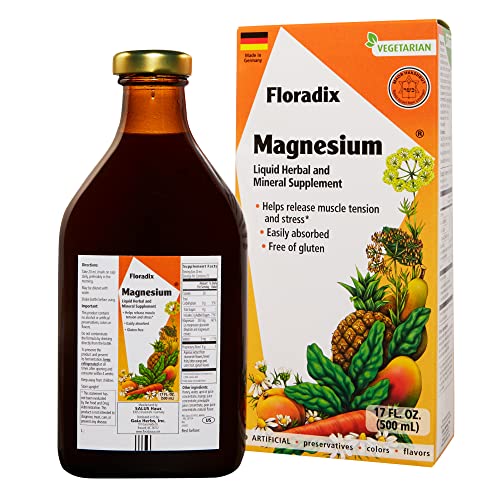
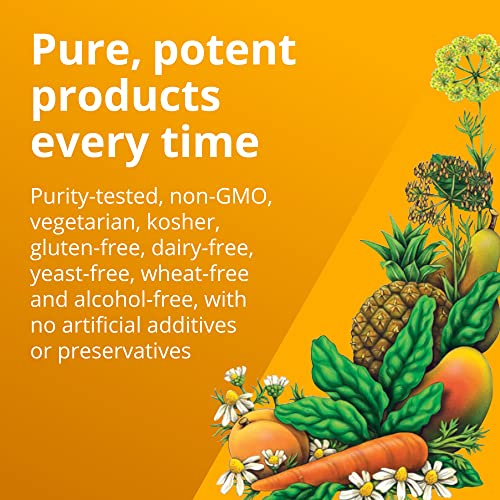
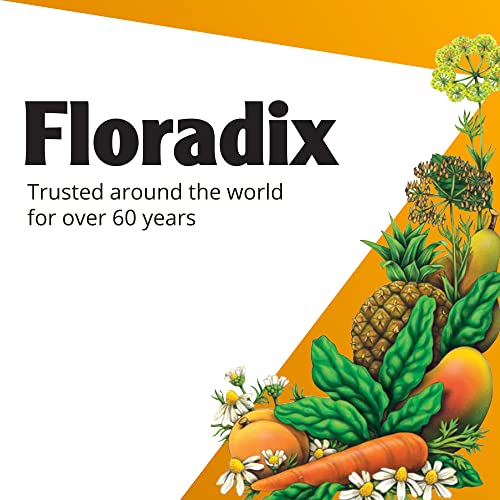
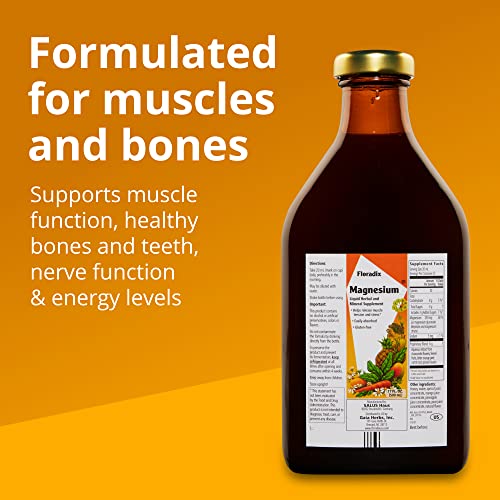
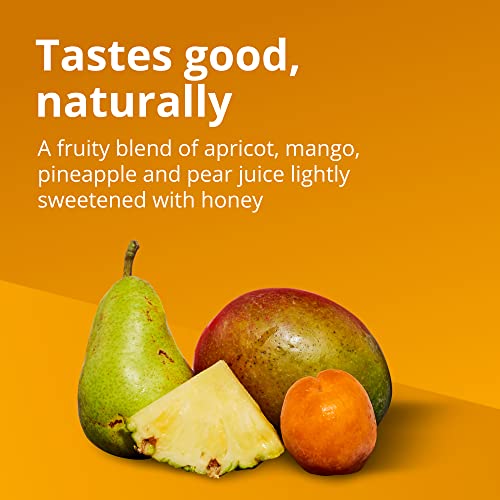
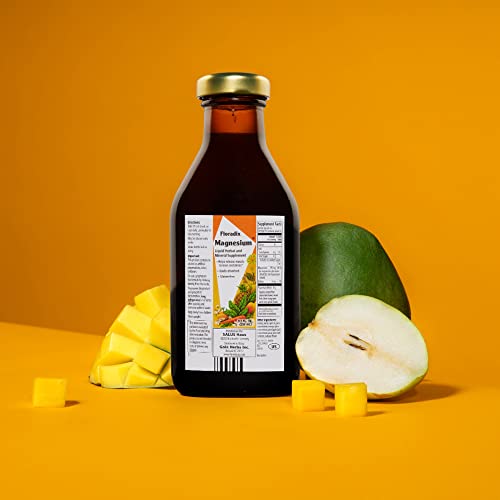
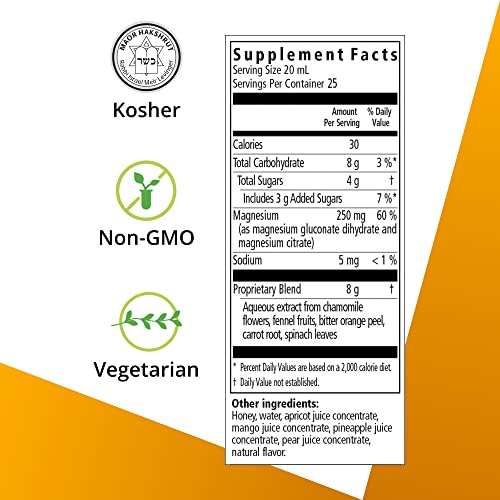
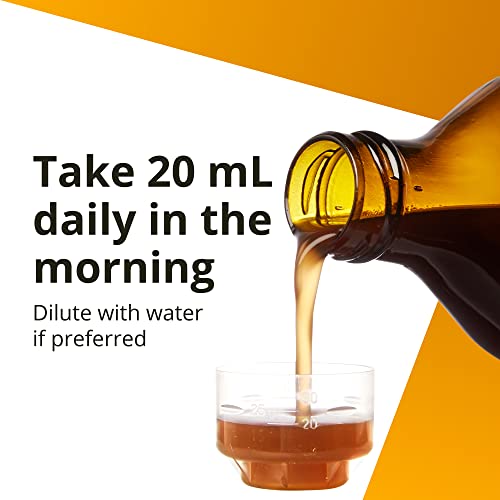
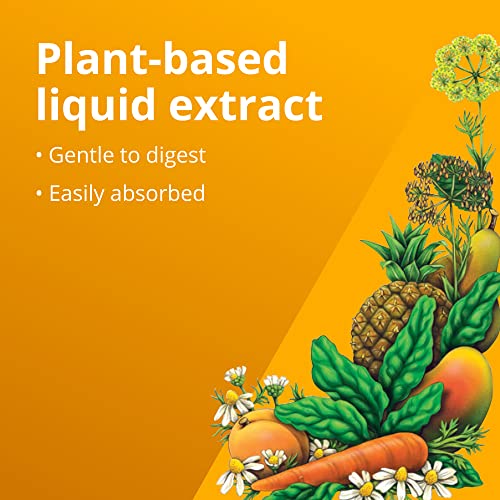
Floradix Magnesium Liquid Supplement - Supports Muscle & Bone Health, Non-GMO, 17 Fl Oz


Chamomile Flowers
High RiskChamomile flowers are derived from the flowering heads of the Matricaria chamomilla plant, primarily utilized for their potential calming effects and anti-inflammatory properties. They are commonly used in herbal teas, skincare products, and dietary supplements.
Sustai Insights
Chamomile flowers offer functional benefits, including anti-inflammatory and calming properties, making them popular in herbal remedies. However, they carry a high allergenic potential, particularly for individuals with ragweed allergies, and can cause skin irritation. Environmental risks are low, as they are not known pollutants. Regulatory status is favorable, with no current restrictions. Overall, the ingredient presents a high risk profile, particularly concerning allergies, necessitating caution in usage and consideration of alternatives such as calendula for those sensitive to chamomile.
Sodium
Low RiskSodium is a chemical element commonly used in various products, primarily as a preservative and stabilizing agent. It is involved in numerous reactions, contributing to the overall functionality and safety of formulations.
Sustai Insights
Sodium serves as an effective preservative, helping to extend product shelf life. It is generally recognized as safe with low concerns for carcinogenicity, allergies, and reproductive toxicity. However, excessive exposure may lead to health issues like hypertension. Environmentally, sodium is considered low risk regarding pollution and bioaccumulation. Regulatory bodies have not imposed significant restrictions on its use. Overall, the risk associated with sodium is low, making it a suitable ingredient with no major health or environmental concerns.
Magnesium Citrate
Low RiskMagnesium citrate is a magnesium salt of citric acid, commonly used in cosmetic formulations as a stabilizing agent and to enhance product texture. It aids in moisture retention and can contribute to the overall effectiveness of various cosmetic products.
Sustai Insights
Magnesium citrate serves functional benefits by stabilizing formulations and improving texture, while its low risk profile suggests minimal health hazards, including low concerns for carcinogenicity, allergies, and reproductive toxicity. Environmentally, it presents low risks as a pollutant or bioaccumulative substance. Regulatory bodies impose few restrictions, indicating a favorable status. Safe usage practices are recommended, with alternatives available such as magnesium chloride or magnesium sulfate for similar benefits. Overall, the assessment concludes a low risk associated with magnesium citrate.
Honey
Low RiskHoney is a saccharic secretion gathered and stored by honeybees, primarily composed of sugars such as fructose and glucose. It is commonly used in cosmetic products for its humectant properties, helping to retain moisture and improve skin hydration.
Sustai Insights
Honey offers functional benefits such as moisturizing and soothing properties, contributing to skin care formulations. It has a low risk of health concerns, including potential allergenic reactions and endocrine disruption. Environmentally, honey is generally sustainable, being biodegradable and often sourced ethically. Regulatory bodies place low restrictions on its use, but it should be avoided by individuals with bee allergies. Overall, the ingredient presents a low risk profile for consumers.
Prunus Armeniaca (Apricot) Fruit
Low RiskPrunus armeniaca (apricot) fruit is the edible fruit of the apricot tree, commonly found in temperate regions. It is characterized by its soft, orange flesh and sweet flavor, often used in food products, cosmetics, and skin care formulations for its moisturizing properties.
Sustai Insights
Prunus armeniaca (apricot) fruit offers functional benefits such as moisturizing and nourishing skin, making it a valuable ingredient in cosmetic formulations. It is sustainably sourced and biodegradable. Known health risks are low, with minimal associations to carcinogenicity, allergies, or developmental toxicity. Environmental risks are also low, with no significant pollutant potential. Regulatory bodies do not impose restrictions on its use, affirming its safety. Overall, the ingredient presents a low risk profile and is suitable for various applications, with no significant concerns regarding exposure or alternatives.
Daucus Carota Sativa (Carrot) Root
Low RiskDaucus carota sativa (carrot) root is a plant-derived ingredient commonly used in cosmetics and personal care products for its moisturizing and antioxidant properties. It is recognized for its potential benefits in skin health due to its nutrient-rich profile, including vitamins and minerals.
Sustai Insights
Daucus carota sativa exhibits functional benefits such as moisturization and antioxidant effects, which can enhance skin texture. It is biodegradable and often sustainably sourced. Health risks are considered low, with minimal concerns regarding carcinogenicity, allergy, or toxicity, as noted by the FDA. Environmental risks are also low, with no significant pollutant or bioaccumulation potential. Regulatory bodies have not issued restrictions, reinforcing its safe use. Overall, this ingredient is assessed as low risk, making it a favorable option in formulations.
Water
Low RiskWater is a clear, colorless liquid essential for various biological processes. It serves as a solvent in formulations, facilitating the dissolution of other ingredients and enhancing product texture and application. Additionally, water plays a crucial role in hydration and is a key component in many cosmetic and personal care products.
Sustai Insights
Water is an effective solvent and hydrator, contributing to the texture and efficacy of formulations. It is biodegradable and generally regarded as safe, with low concerns regarding carcinogenicity, allergies, and reproductive toxicity. However, excessive water usage can lead to environmental concerns, particularly regarding resource depletion. Regulatory bodies do not impose restrictions on water use in cosmetics. Overall, the risks associated with water are low, making it a safe and essential ingredient.
Sodium
Low RiskSodium is a chemical element commonly used in various products, primarily as a preservative and stabilizing agent. It is involved in numerous reactions, contributing to the overall functionality and safety of formulations.
Sustai Insights
Sodium serves as an effective preservative, helping to extend product shelf life. It is generally recognized as safe with low concerns for carcinogenicity, allergies, and reproductive toxicity. However, excessive exposure may lead to health issues like hypertension. Environmentally, sodium is considered low risk regarding pollution and bioaccumulation. Regulatory bodies have not imposed significant restrictions on its use. Overall, the risk associated with sodium is low, making it a suitable ingredient with no major health or environmental concerns.
Magnesium Citrate
Low RiskMagnesium citrate is a magnesium salt of citric acid, commonly used in cosmetic formulations as a stabilizing agent and to enhance product texture. It aids in moisture retention and can contribute to the overall effectiveness of various cosmetic products.
Sustai Insights
Magnesium citrate serves functional benefits by stabilizing formulations and improving texture, while its low risk profile suggests minimal health hazards, including low concerns for carcinogenicity, allergies, and reproductive toxicity. Environmentally, it presents low risks as a pollutant or bioaccumulative substance. Regulatory bodies impose few restrictions, indicating a favorable status. Safe usage practices are recommended, with alternatives available such as magnesium chloride or magnesium sulfate for similar benefits. Overall, the assessment concludes a low risk associated with magnesium citrate.
Honey
Low RiskHoney is a saccharic secretion gathered and stored by honeybees, primarily composed of sugars such as fructose and glucose. It is commonly used in cosmetic products for its humectant properties, helping to retain moisture and improve skin hydration.
Sustai Insights
Honey offers functional benefits such as moisturizing and soothing properties, contributing to skin care formulations. It has a low risk of health concerns, including potential allergenic reactions and endocrine disruption. Environmentally, honey is generally sustainable, being biodegradable and often sourced ethically. Regulatory bodies place low restrictions on its use, but it should be avoided by individuals with bee allergies. Overall, the ingredient presents a low risk profile for consumers.
Prunus Armeniaca (Apricot) Fruit
Low RiskPrunus armeniaca (apricot) fruit is the edible fruit of the apricot tree, commonly found in temperate regions. It is characterized by its soft, orange flesh and sweet flavor, often used in food products, cosmetics, and skin care formulations for its moisturizing properties.
Sustai Insights
Prunus armeniaca (apricot) fruit offers functional benefits such as moisturizing and nourishing skin, making it a valuable ingredient in cosmetic formulations. It is sustainably sourced and biodegradable. Known health risks are low, with minimal associations to carcinogenicity, allergies, or developmental toxicity. Environmental risks are also low, with no significant pollutant potential. Regulatory bodies do not impose restrictions on its use, affirming its safety. Overall, the ingredient presents a low risk profile and is suitable for various applications, with no significant concerns regarding exposure or alternatives.
Daucus Carota Sativa (Carrot) Root
Low RiskDaucus carota sativa (carrot) root is a plant-derived ingredient commonly used in cosmetics and personal care products for its moisturizing and antioxidant properties. It is recognized for its potential benefits in skin health due to its nutrient-rich profile, including vitamins and minerals.
Sustai Insights
Daucus carota sativa exhibits functional benefits such as moisturization and antioxidant effects, which can enhance skin texture. It is biodegradable and often sustainably sourced. Health risks are considered low, with minimal concerns regarding carcinogenicity, allergy, or toxicity, as noted by the FDA. Environmental risks are also low, with no significant pollutant or bioaccumulation potential. Regulatory bodies have not issued restrictions, reinforcing its safe use. Overall, this ingredient is assessed as low risk, making it a favorable option in formulations.
Water
Low RiskWater is a clear, colorless liquid essential for various biological processes. It serves as a solvent in formulations, facilitating the dissolution of other ingredients and enhancing product texture and application. Additionally, water plays a crucial role in hydration and is a key component in many cosmetic and personal care products.
Sustai Insights
Water is an effective solvent and hydrator, contributing to the texture and efficacy of formulations. It is biodegradable and generally regarded as safe, with low concerns regarding carcinogenicity, allergies, and reproductive toxicity. However, excessive water usage can lead to environmental concerns, particularly regarding resource depletion. Regulatory bodies do not impose restrictions on water use in cosmetics. Overall, the risks associated with water are low, making it a safe and essential ingredient.
Chamomile Flowers
High RiskChamomile flowers are derived from the flowering heads of the Matricaria chamomilla plant, primarily utilized for their potential calming effects and anti-inflammatory properties. They are commonly used in herbal teas, skincare products, and dietary supplements.
Sustai Insights
Chamomile flowers offer functional benefits, including anti-inflammatory and calming properties, making them popular in herbal remedies. However, they carry a high allergenic potential, particularly for individuals with ragweed allergies, and can cause skin irritation. Environmental risks are low, as they are not known pollutants. Regulatory status is favorable, with no current restrictions. Overall, the ingredient presents a high risk profile, particularly concerning allergies, necessitating caution in usage and consideration of alternatives such as calendula for those sensitive to chamomile.
Discover the power of Floradix Magnesium, a vegetarian liquid supplement designed to support healthy bones, teeth, and muscles. Each 17 Fl Oz bottle delivers 250 mg of magnesium in a delicious blend of natural fruit juice concentrates, making it a perfect addition to your daily wellness routine.
- Muscle and Bone Support: Aids in maintaining strong bones and muscles, essential for overall vitality.
- Gentle on Digestion: Our plant-based formula is easy on the stomach and absorbs quickly, ensuring maximum benefits.
- Natural Ingredients: Lightly sweetened with honey, this supplement uses only natural fruit juice concentrates—apricot, mango, pineapple, and pear—for a delightful taste.
- Allergen-Free and Pure: Non-GMO, vegetarian, gluten-free, and free from artificial additives, making it suitable for various dietary needs.
- Quality Assurance: Rigorously tested for consistency, potency, and purity, ensuring you receive a premium product with every dose.
Subscribe & Save with Sustai
- Best Price Guarantee: Always enjoy the lowest prices on sustainable home essentials.
- No Surprises: We’ll notify you before shipping. No hidden fees, ever.
- You’re in Charge: Change, pause, or cancel your subscription anytime with ease.
- Eco-Friendly Deliveries: Our grouped shipments mean less packaging and lower emissions.
Join us on a sustainable journey. Special offers for a limited time! Prices and promotions may change.
Recommended Products
Discover the power of Floradix Magnesium, a vegetarian liquid supplement designed to support healthy bones, teeth, and muscles. Each 17 Fl Oz bottle delivers 250 mg of magnesium in a delicious blend of natural fruit juice concentrates, making it a perfect addition to your daily wellness routine.
- Muscle and Bone Support: Aids in maintaining strong bones and muscles, essential for overall vitality.
- Gentle on Digestion: Our plant-based formula is easy on the stomach and absorbs quickly, ensuring maximum benefits.
- Natural Ingredients: Lightly sweetened with honey, this supplement uses only natural fruit juice concentrates—apricot, mango, pineapple, and pear—for a delightful taste.
- Allergen-Free and Pure: Non-GMO, vegetarian, gluten-free, and free from artificial additives, making it suitable for various dietary needs.
- Quality Assurance: Rigorously tested for consistency, potency, and purity, ensuring you receive a premium product with every dose.

You can have at most 2 Sustainable Steals products in your cart
Customer Reviews
Customers’ View
Customers appreciate the effectiveness and gentle formulation of this magnesium supplement, particularly valuing its liquid form for easy absorption. Many users have noted improvements in muscle relaxation and energy levels, with one customer highlighting that it has helped their elderly mother immensely. The product's natural fruit flavors are also well-received, making it a pleasant addition to their daily routine. Customers commend its allergen-free and non-GMO attributes, aligning with health-conscious values. Overall, this supplement is viewed as a reliable option for those looking to enhance their wellness, though some have expressed a desire for larger bottle sizes due to frequent usage.
AI-generated from the text of customer reviewsThis product has no reviews yet.




